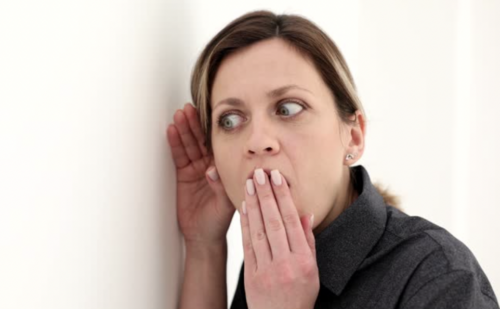Eavesdropping can go one of two ways–people either politely ignore an awkward conversation or excitedly lean into it. Over time, I admit, I’ve become drawn to the latter. But it’s honestly not about prying. It’s more about being at the right place at the right time to appreciate an honest, unscripted glimpse into the secret lives of strangers.
Take, for instance, a conversation I heard earlier this week in the Commons: “You should really go to college.” “No! I’m sick of studying, and I have ADD. I don’t wanna be in school anymore.” It’s a simple exchange at the surface, but underneath these words likely lie a lot of hurt.
Or how about in the bathroom last week. I overheard a female voice say, “It’s Fieldston. And everyone at Fieldston is stressed.” It’s easy to assume that everyone here has their life put together. Yet, for me, this simple observation was a reminder that we all experience similar pressures. Strangely, it was comforting for me to know that we’re all in this together–buried in tests, homework, after school commitments and the bittersweet uneasiness that our lives together within these walls are quickly coming to an end.
One company made a brand out of eavesdropping. The social media brand Overheard was started in 2015 by someone who overheard a silly conversation in a Los Angeles Erewhon grocery store. While there is no Overheard Fieldston, there is Overheard New York, London, and other cities. Some of my favorites on Instagram are:
“I love talking to my doorman so much that I stopped going to my therapist.”
“Plastic surgery is different in New York; you want to look realistic. In LA, you can look like an alien as long as you don’t have wrinkles.”
Perhaps one of the more notorious shows about eavesdropping is Gossip Girl, a series from 2007 to 2012 that followed the scandalous lives of teenagers attending an elite private school on the Upper East Side of Manhattan. The show was narrated by a secret blogger, aka Gossip Girl. Critically well-reviewed with a cult following, the series elevated the guilty pleasures of eavesdropping and gossiping. It deployed clever allusions to high-brow literature, such as Edith Wharton’s “Age of Innocence” and Ernest Hemingway’s “The Sun Also Rises,” intermixed with pop culture, while paying homage to many of NYC’s iconic sites, such as Grand Central Terminal, Central Park’s Bethesda Fountain and the steps of the Metropolitan Museum of Art. When asked why she thinks eavesdropping is so enticing, as glamorized by Gossip Girl, which still has a cult following even today more than ten years after the show last aired, Ella Eisenberg replied, “Social media, for example, is what people are choosing to show. Eavesdropping is realistic, raw…it’s an unfiltered glimpse into what their lives are really like. It’s entertaining. It takes our minds off our own problems for a while.”
Eavesdropping isn’t just a way to pass the time; it can spark creativity. Sometimes, the stories we overhear can turn into something bigger. Take Aaron Sorkin, for example, who worked as a cab driver and bartender before making a name for himself as a screenwriter. It was through listening to people’s conversations–the raw, candid moments–that he started to develop ideas for characters and plotlines. The way people express anger, happiness, or other casual observations all became material for his scripts–he even wrote “A Few Good Men” on a pile of napkins while working his shift as a bartender. These unscripted moments, when captured, really do have the power to shape art in unexpected ways.
People are social creatures. We are naturally curious about each other. Eavesdropping is a way for us to quietly observe human nature and understand one another better. At least that’s what I tell myself when I’m leaning into a confidential conversation.






